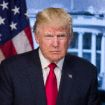Once again, US President Donald Trump has been accused of using music without consent at election rallies. This latest charge has real bite. That's because it comes from John Fogerty, the leader of a band that was huge in the 1970s, Credence Clearwater Revival. Fogerty served in Vietnam and sang about the Vietnam war in a song called Fortunate Son.

Fortunate Son dealt with the huge divides that exist in the USA. In the words of the song, "some folks are born, silver spoon in hand." Fortunate Son dealt with the fact that the silver spooners have awesome power: "Ooh, they send you down to war, Lord." Most importantly, it dealt with the fact that the sons of the elite don't do war: "I ain't no senator's son, I ain't no fortunate one, no." Which may go some way to explaining Trump's recent much-publicised comment that the American war dead are "suckers" and "losers".
Fogerty is clearly very aggrieved by this unauthorised use of his song. He is quoted in the publication NME as saying this: "As a veteran, I was disgusted that some people were allowed to be excluded from serving our country because they had access to political and financial privilege." Fogerty accuses Trump of "using my words and my voice to portray a message that I do not endorse." Fogerty also shows that he's up to date with the news: "I also wrote about wealthy people not paying their fair share of taxes. Mr. Trump is a prime example of both of these issues."
The article goes on to make the point that Fogerty is not alone. Phil Collins has had to send a demand regarding Trump's unauthorised use of the song In The Air Tonight. We're told that a number of other artists saw the need to lodge complaints about the unauthorised use by Donald Trump of music during the course of 2020: Neil Young, Dexys Midnight Runners, The Rolling Stones, Linkin Park and the estate of Tom Petty.
It's well-known that music enjoys copyright, that the unauthorised use of copyright material is an infringement, and that in order to legally use copyright material you need a licence. A man who has been in business for his entire adult life most certainly knows these things. Especially one who himself has a significant portfolio of trade mark registrations, assets that he uses to earn royalties. If by any chance that man has forgotten these things, the many advisers who surround him surely haven't. These advisers might just remind him that there's more than just copyright involved here - the use of the music of a well-known artist at an election rally may very well suggest celebrity endorsement.
We seem to have been writing about Donald Trump's weird relationship with IP for years now. Trump clearly thinks that IP is very important for his business interests because he registers his trade marks and he enters into trade mark licencing agreements. Yet, the IP of others is seemingly of no concern.
Trump also interferes in IP matters when he sees fit. We've reported on how Trump regarded the election of a new World Intellectual Property Office (WIPO) chief as a subject worthy of his attention, when he backed the candidate from Singapore rather than the candidate from China. Trump has also been known to oppose trade mark applications for the name Trump that were filed in the name of a third party.
The unfortunate reality is that Trump's actions over the past few years have to a certain extent discredited IP. This is absurd, given that the USA is considered the bastion of capitalism, and the President of the USA is considered by many to be the leader of the free world. Perhaps the one thing we as IP lawyers can hope for is that IP's reputation as a driver of economic growth can be fully restored.
The content of this article is intended to provide a general guide to the subject matter. Specialist advice should be sought about your specific circumstances.

